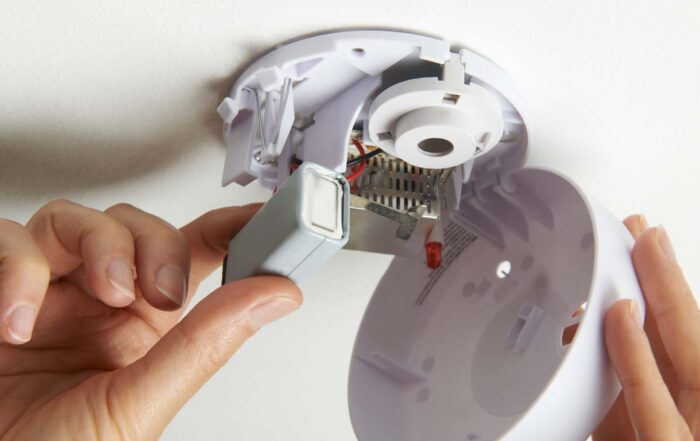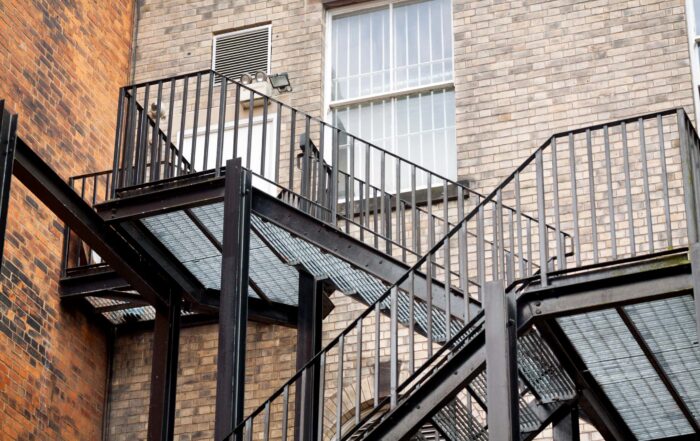The Ultimate Guide to Commercial Fire Detection Systems
When installing a fire alarm for your commercial premises, it is important to select a solution that is right for your business. Fire prevention systems must factor in size, location, budget and unit contents as to ensure the most effective protection possible. Different fire detection devices offer their users different advantages and disadvantages.
In this blog from Sovereign Fire and Security, we outline a range of fire detection systems that are suited to commercial contexts, making particular note of their advantages, disadvantages and ideal setting for use.
Conventional Fire Alarm Systems
Comprised of a selection of simple components, conventional fire alarms are the most popular fire alert system for commercial settings. They can contain several fire alarm detectors located within different parts of a building, all of which are connected via one wire to a central control panel. When a detector is set off, alarms sound for building evacuation.
Conventional fire alarms are often cheaper to purchase than other alarm varieties and are most suitable for small businesses with smaller premises.
Due to their design, conventional fire alarm systems cannot give the exact location of a fire. This can be overcome, however, with deliberate wiring, which can allow operators to identify the zone in which a detector has been triggered.
The individual wiring of each detector can cause problems in the event of severed wires, though – a severed wire could prevent the control panel from being alerted of a developing fire, which poses a risk to the occupants of a building.
Wireless Fire Alarm Systems
Wireless fire alarms (sometimes referred to as radio fire alarms) do not feature wires to link detectors and sounders. They offer an appropriate solution for premises that span numerous buildings such as hotels and schools. Wireless systems are different to wired systems in that they send signals via radio link; each detector also has its own address which allows the exact location of a fire.
A main advantage of wireless systems is their comparatively quicker installation time than other systems. Quicker installation limits disruption to the premises whilst the system is being set-up.
Wireless systems also offer a less cumbersome look than wired systems – making them more suitable for premises where exposed cable is not appropriate, whether that be due to health and safety or for aesthetic reasons.
The more precise alert system available with wireless systems also limits the need for full evacuations, as the precise location of a hazard can be easily detected. However, wireless systems are more costly and may exceed the budget of smaller businesses.
Monitored Fire Alarm Systems
Alarm systems can be monitored or unmonitored. Monitored systems are observed by a provider company who are directly notified in the event of a developing or active hazard. When a monitored device is triggered, the provider is immediately contacted and the investigation of the alert begins. This first part of this process is to establish whether an alert is legitimate or erroneous. The legitimacy of an alert is confirmed through a contact at the customer business – once confirmation is achieved, monitoring companies will contact the appropriate emergency service.
Monitored alarm systems ensure the safety of a premises even when it is not in use, which offers a more extensive safety procedure that factors in the unpredictability of fire. Although, as expected, the regularity of monitoring is reflected within the fees attached to monitored systems.
Another advantage of monitored systems is their convenience. In the event of emergency, monitoring companies contact emergency services on behalf of their client, allowing them to prioritise safety from potential threat for themselves and their staff/visitors. Many monitoring systems also allow customers remote access to alerts in their homes using apps. This offers users peace of mind about their premises during their absence.
Monitoring also ensures that any alerts receive a rapid response. A quick response reduces potential damage to a premises and its contents. So, while some argue that monitored systems are an unnecessary expense – the monthly cost of monitoring is certainly worthwhile when compared to the losses that could be caused by a fire in an unmonitored unit.
Aspirating Fire Alarm Systems
Aspirating alarm systems feature a network of pipes which detect pre-combustion smoke particles. They are particularly effective in larger spaces, such as warehouses, especially those used by high-risk industries where buildings are home to expensive products/equipment or high value information, like data. Continuous air sampling allows for the most rapid response possible, consequently limiting potential damage.
A key advantage of aspirating fire detection systems is their increased sensitivity. Early detection technology allows aspirating systems to respond to developing hazards up to 30 times faster than other fire detection solutions. In addition to this, efficiency is maximised with aspirating systems due to their lack of sensitivity to false triggers – meaning fewer false alarms.
See more: What is an Aspirating Smoke Detection System?
Commercial Fire Detection Systems with Sovereign Fire and Security
Every business has individual fire detection needs that are influenced by a variety of contextual factors. Here at Sovereign Fire & Security, we provide innovative and reliable commercial fire detection systems for businesses of all types and sizes.
If you’re looking to equip your building with an effective fire detection system, please don’t hesitate to get in touch. Our team of industry experts are on hand to offer advice and guidance on our range of fire and life safety systems. We will curate a plan for your fire and security needs to give you peace of mind for your premises or property.
See more: The Importance of Fire Alarm Testing, Servicing & Maintenance
Recent Articles
Innovations and Regulations for Smoke Detection and Fire Alarms
Making sure your fire safety systems are up to standards saves lives, protects your building, and ensures you’re compliant with government regulations. However, with so many types of alarm systems [...]
Fire and Security – The Complete Guide to Fire Escape Regulations in the UK
Fire risks are real, with 622,173 incidents attended by Fire and Rescue Services in England for the year ending March 2023. Many things can keep you safe from fires. But [...]
Fire Safety for Mixed-Use Buildings
Ensuring you have up to date fire safety systems for your mixed-use building isn’t just a good way to keep your residents and structure safe and secure – it is a legal requirement. [...]




